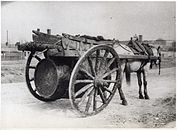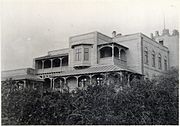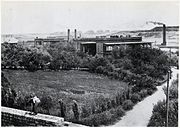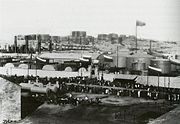Branobel
The Petroleum Production Company Nobel Brothers, Limited, or Branobel (short for братьев Нобель "brat'yev Nobel" – "Nobel Brothers" in
Cheleken, Turkmenistan.[1]
Originally established by Robert Nobel (who contributed 25,000 rubles) and the investments of barons Peter von Bilderling (300,000 rubles) and Standertskjöld (150,000 rubles) as a distillery in 1876, it became, during the late-19th century, one of the largest oil-companies in the world.
History

The Nobel Brothers Petroleum Company was an oil-producing company that had its origins in a distillery, founded by
Pipeline transport was pioneered near Baku by Vladimir Shukhov and the Branobel company in 1878–1880. On 10 April 1902, the company signed a contract for the purchase of oil fields in Romany, which were owned by the oil producer Isabey Hajinsky. On 17 October 1905, in accordance with the Committee of Ministers, the company purchased the oil fields owned by oil producer A. Adamov. The company's fixed capital in 1914–1917 was 30 million rubles. By 1916, it was the largest oil company in Russia, producing 76 million poods of oil.[citation needed
]
Between 1877 and 1901, the company drilled over 500 wells, produced 150 million
barrels of oil, and employed 12,000 workers.[2]
Challenges

In 1912, the Russian General Oil Corporation was founded in London as an English holding company and united some 20 of the most important Russian and foreign banks. These included:
- A.I. Mantashev & Co.
- G.M. Lianozov Sons
- Moscow-Caucasus Trade Company
- Caspian Partnership
- Russian Petroleum Society
- Absheron Petroleum Society
By 1914, the fixed capital in oil exceeded 120 million
A.I. Mantashev & Co., the Anglo-Russian Maximov Oil Company in London and G.M. Lianozov Sons, of which he personally owned a third.[3]
About 12% of the money left to establish the
Nobel Prizes by Alfred Nobel
came from his shares in the company; he was its largest individual investor.
The Russian Revolution and Branobel
On 28 April 1920, the
Bolshevik regime would last and the negotiation led by Gustaf Nobel, on one side, and Walter C. Teagle, on the other, proved to be a profitable masterstroke for the Nobel family.[4]
Branobel was formally dissolved in 1959 and its last President was
Marta Nobel-Oleinikoff and grandson of Ludvig Nobel
.
Photogallery
- More photos can be found at Tekniska museetin Stockholm, Sweden.
Gallery
-
The Nobels' oil facilities in Baku
-
Ludwig Nobel's Mechanical Workshop in Petersburg, Branobels board downstairs
-
Older naphtha transportation
-
Zoroaster, the world's first tanker, 2000 ton tanker for the Caspian Sea, design by Ludvig Nobel and Sven Alexander Almqvist, built by Sven Alexander Almqvist at Motala Verkstad and delivered to the Nobel brothers in Russia
-
The Nobels' oil facilities in Baku
-
The Nobels' oil facilities in Baku
-
Baku
-
Baku
-
The managers' residence Villa Petrolea in Baku
-
The managers' residence Villa Petrolea in Baku
-
The managers residence Villa Petrolea in Baku
-
Stamp of Azerbaijan, 1994
-
In 1888, Tsar Alexander III visited Baku with his family and ministers. Engineer Edvin Bergroth was responsible for security, and despite all the threats against the imperial family, the Tsar was able to walk around the Nobels' factories without any visible police nearby.
See also
References
- Tolf, Robert, The Russian Rockefellers (Stanford, 1976)
- Yergin, Daniel (2003): The Prize: the Epic Quest for Oil, Money and Power, Free Press, p. 58. ISBN 0-671-79932-0
- Åsbrink, Brita (2001): Ludvig Nobel: "Petroleum har en lysande framtid!" Wahlström & Widstrand, p. 19. ISBN 978-91-46-18181-1
- Mir-Babayev M.F. The role of Azerbaijan in the World's oil industry – "Oil-Industry History" (USA), 2011, v. 12, no. 1, p. 109-123.
- Mir-Babayev M.F. and Atabeyli B. The unknown Nobel Prize in Baku – "Oil-Industry History" (USA), 2013, v. 14, no. 1, p. 117-124.
External links
Wikimedia Commons has media related to Branobel.













